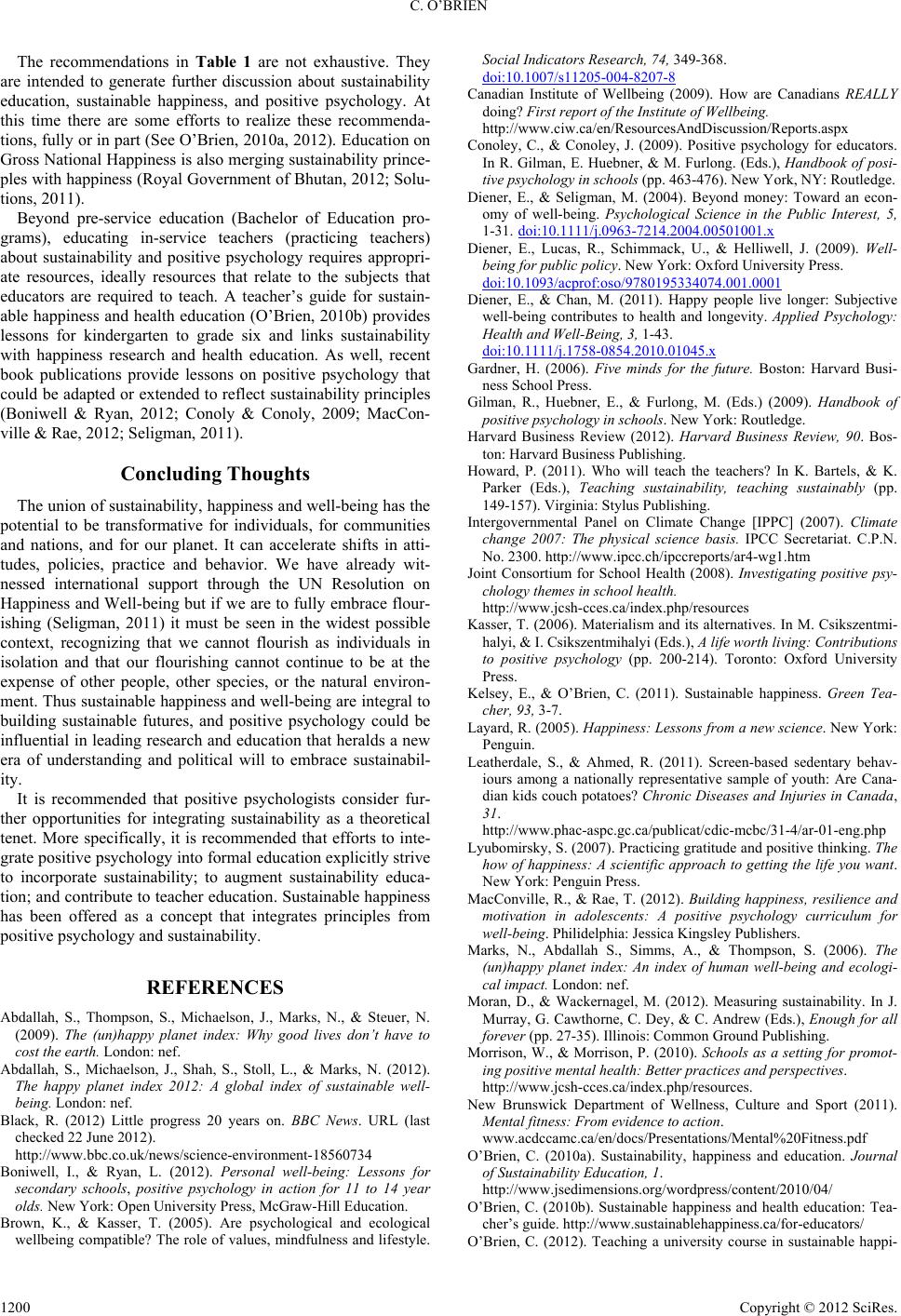
C. O’BRIEN
The recommendations in Table 1 are not exhaustive. They
are intended to generate further discussion about sustainability
education, sustainable happiness, and positive psychology. At
this time there are some efforts to realize these recommenda-
tions, fully or in part (See O’Brien, 2010a, 2012). Education on
Gross National Happiness is also merging sustainability prince-
ples with happiness (Royal Government of Bhutan, 2012; Solu-
tions, 2011).
Beyond pre-service education (Bachelor of Education pro-
grams), educating in-service teachers (practicing teachers)
about sustainability and positive psychology requires appropri-
ate resources, ideally resources that relate to the subjects that
educators are required to teach. A teacher’s guide for sustain-
able happiness and health education (O’Brien, 2010b) provides
lessons for kindergarten to grade six and links sustainability
with happiness research and health education. As well, recent
book publications provide lessons on positive psychology that
could be adapted or extended to reflect sustainability principles
(Boniwell & Ryan, 2012; Conoly & Conoly, 2009; MacCon-
ville & Rae, 2012; Seligman, 2011).
Concluding Thoughts
The union of sustainability, happiness and well-being has the
potential to be transformative for individuals, for communities
and nations, and for our planet. It can accelerate shifts in atti-
tudes, policies, practice and behavior. We have already wit-
nessed international support through the UN Resolution on
Happiness and Well-being but if we are to fully embrace flour-
ishing (Seligman, 2011) it must be seen in the widest possible
context, recognizing that we cannot flourish as individuals in
isolation and that our flourishing cannot continue to be at the
expense of other people, other species, or the natural environ-
ment. Thus sustainable happiness and well-being ar e integral to
building sustainable futures, and positive psychology could be
influential in leading research and education that heralds a new
era of understanding and political will to embrace sustainabil-
ity.
It is recommended that positive psychologists consider fur-
ther opportunities for integrating sustainability as a theoretical
tenet. More specifically, it is recommended that efforts to inte-
grate positive psychology into formal education explicitly strive
to incorporate sustainability; to augment sustainability educa-
tion; and contribute to teacher education. Sustainable happiness
has been offered as a concept that integrates principles from
positive psychology and sustainability.
REFERENCES
Abdallah, S., Thompson, S., Michaelson, J., Marks, N., & Steuer, N.
(2009). The (un)happy planet index: Why good lives don’t have to
cost the earth. London: nef.
Abdallah, S., Michaelson, J., Shah, S., Stoll, L., & Marks, N. (2012).
The happy planet index 2012: A global index of sustainable well-
being. London: nef.
Black, R. (2012) Little progress 20 years on. BBC News. URL (last
checked 22 June 2012).
http://www.bbc.co.uk/news/science-environment-18560734
Boniwell, I., & Ryan, L. (2012). Personal well-being: Lessons for
secondary schools, positive psychology in action for 11 to 14 year
olds. New York: Open University Press, McGraw-Hill Education.
Brown, K., & Kasser, T. (2005). Are psychological and ecological
wellbeing compatible? The role of values, mindfulness and lifestyle.
Social Indicators Resea rc h, 74, 349-368.
doi:10.1007/s11205-004-8207-8
Canadian Institute of Wellbeing (2009). How are Canadians REALLY
doing? First report of the Institute of Wellbeing.
http://www.ciw.ca/en/ResourcesAndDiscussion/Reports.aspx
Conoley, C., & Conoley, J. (2009). Positive psychology for educators.
In R. Gilman, E. Huebner, & M. Furlong. (Eds.), Handbook of posi-
tive psychology in schools (pp. 463-476). New York, NY: Routledge.
Diener, E., & Seligman, M. (2004). Beyond money: Toward an econ-
omy of well-being. Psychological Science in the Public Interest, 5,
1-31. doi:10.1111/j.0963-7214.2004.00501001.x
Diener, E., Lucas, R., Schimmack, U., & Helliwell, J. (2009). Well-
being for public policy. New York: Oxford University Press.
doi:10.1093/acprof:oso/9780195334074.001.0001
Diener, E., & Chan, M. (2011). Happy people live longer: Subjective
well-being contributes to health and longevity. Applied Psychology:
Health and Well-Being, 3, 1-43.
doi:10.1111/j.1758-0854.2010.01045.x
Gardner, H. (2006). Five minds for the future. Boston: Harvard Busi-
ness School Press.
Gilman, R., Huebner, E., & Furlong, M. (Eds.) (2009). Handbook of
positive psychology in sch o o ls. New York: Routledge.
Harvard Business Review (2012). Harvard Business Review, 90. Bos-
ton: Harvard Business Publishing .
Howard, P. (2011). Who will teach the teachers? In K. Bartels, & K.
Parker (Eds.), Teaching sustainability, teaching sustainably (pp.
149-157). Virginia: Stylus Publishing.
Intergovernmental Panel on Climate Change [IPPC] (2007). Climate
change 2007: The physical science basis. IPCC Secretariat. C.P.N.
No. 2300. http://www.ipcc.ch/ipccreports/ar4-wg1.htm
Joint Consortium for School Health (2008). Investigating positive psy-
chology themes in school health.
http://www.jcsh-cces.ca/index.php/resources
Kasser, T. (2006). Materialism and its alternatives. In M. Csikszentmi-
halyi, & I. Csikszentmihalyi (Eds.), A life worth living: Contributions
to positive psychology (pp. 200-214). Toronto: Oxford University
Press.
Kelsey, E., & O’Brien, C. (2011). Sustainable happiness. Green Tea-
cher, 93, 3-7.
Layard, R. (2005). Happiness: Lessons from a new science. New York:
Penguin.
Leatherdale, S., & Ahmed, R. (2011). Screen-based sedentary behav-
iours among a nationally representative sample of youth: Are Cana-
dian kids couch potatoes? Chronic Diseases and Injuries in Canada,
31.
http://www.phac-aspc.gc.ca/publicat/cdic-mcbc/31-4/ar-01-eng.php
Lyubomirsky, S. (2007). Practicing gratitude and positive thinking. The
how of happiness: A scientific approach to getting the life you want.
New York: Penguin Press.
MacConville, R., & Rae, T. (2012). Building happiness, resilience and
motivation in adolescents: A positive psychology curriculum for
well-being. Philidelphia: Jessica Kingsley Publishers.
Marks, N., Abdallah S., Simms, A., & Thompson, S. (2006). The
(un)happy planet index: An index of human well-being and ecologi-
cal impact. London: nef.
Moran, D., & Wackernagel, M. (2012). Measuring sustainability. In J.
Murray, G. Cawtho rne, C. Dey, & C. Andrew (Eds.), Enough for all
forever (pp. 27-35). Illinois: Common Ground Publishing.
Morrison, W., & Morrison, P. (2010). Schools as a setting for promot-
ing positive mental health: Better practices and perspectives.
http://www.jcsh-cces.ca/index.php/resources.
New Brunswick Department of Wellness, Culture and Sport (2011).
Mental fitness: From evidence to action.
www.acdccamc.ca/en/docs/Presentations/Mental%20Fitness.pdf
O’Brien, C. (2010a). Sustainability, happiness and education. Journal
of Sustainability Edu cation, 1.
http://www.jsedimensions.org/wordpress/content/2010/04/
O’Brien, C. (2010b). Sustainable happiness and health education: Tea-
cher’s guide. http://www.sustainableha ppiness.ca/for-educators/
O’Brien, C. (2012). Teaching a university course in sustainable happi-
Copyright © 2012 SciRes.
1200